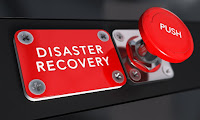Hurricanes and Helping Distributors
 First Houston and the Gulf shores and now Florida is set to go under. Natural disasters are tough on distributors and even harder on our customers. I know from firsthand experience. I thought this might be a good time for distributors to share their knowledge of natural disasters and would like to invite everyone who has lived through one of these events to share their experience and provide tips and support.
First Houston and the Gulf shores and now Florida is set to go under. Natural disasters are tough on distributors and even harder on our customers. I know from firsthand experience. I thought this might be a good time for distributors to share their knowledge of natural disasters and would like to invite everyone who has lived through one of these events to share their experience and provide tips and support. Without going into massive details, Iowa has had more than its share of flooding. I went through the great Des Moines flood of 1993, which put much of the downtown underwater and flooded countless industrial facilities. We went without running water for 29 days which meant no drinking water, no workable toilets and put the nearest shower at an army base nearly 20 miles away. For a week or so, every business deemed unnecessary for infrastructure rebuilding was ordered closed. Electrical distributors were viewed as important. We were told “not to close."
At that point in my career I was an electrical/automation distributor, so these thoughts come from that perspective. Conversations with distributors in other fields point to similar situations.
Expect a massive surge of business
From the electrical perspective, flooding creates a massive surge of business, but not immediately. From my experience, business will start as a trickle and reach a zenith about four weeks after the waters have subsided. The end of this rush of business happens around four or five months later. It generally falls off slowly, but by that time most customers are through their emergency situations.
Predicting what people will need is tricky. In the electrical world the first hit will be for the materials needed to create temporary services and other work arounds which allow construction and other trades to get into the job and do their
work. We asked a couple of our major suppliers to consign inventory of items to our location; many took us up on the offer. For instance, we had a semi-trailer full of transformers stationed outside of our warehouse which we used once our normal inventory was depleted. The same went for flexible conduit, breakers and load centers.
Some of the items you just can’t stock enough of are the following:
• Contact cleaner – Getting the mud and debris out of everything consumes mass quantities of this stuff. You can’t have enough as it will go out the door by the case. We discovered a few companies sell it in bulk in 5 gallon buckets. We sold a couple pallet loads in a week.
• Industrial fans – Everyplace is wet and once the water goes away it gets pretty steamy inside the buildings and electrical rooms. They will sell faster if already assembled.
• Portable Ground Fault connectors (GFCI) – Think about it, wet conditions and temporary connections make for a shock hazard deluxe. In normal conditions some workers will skip using the GFCI precaution, but when they are working in a half inch of water, they are quick to be safety conscious.
• Circuit Breakers - Every variety will fly out the door. In industrial settings, expect people to bring in older model breakers. Some of these are readily available while others require some digging. While I don’t normally advocate for gray-market stuff, we did help a few customers find “surplus” used breakers to get older parts of their plant running.
• Anything electronic – PLC’s, Drives and other equipment are often damaged even if the water level doesn’t reach them. A little bit of humidity plays havoc on printed circuit boards. We did a lot of spare part exchanges and for smaller units we recommended taking them out of service.
• Electric motors – Most agree it’s not cost effective to rewind anything under 50 horsepower. Smaller size motors will fly off the shelf in the fourth week.
Take care of existing customers first
If you have stock, they will come. Some, maybe even many, of the folks coming are not regular customers. While running contrary to the beliefs of many salespeople, all sales are not created equal. I believe it makes great sense to not sell the last part on your shelf to a complete stranger, especially if the product is in short supply. This is tough to monitor but the word needs to go out to your team.
Continuing with the premise of taking care of existing customers, you will encounter massive demand for products which are long lead time and often hard to get from the manufacturer. We discovered that it made sense to assign one person to the location for the expediting of “odd-ball” and long lead time items. Following this practice will speed the process and eliminate duplication of effort with your team. Trust me, after the first two weeks, your team will be busy.
Network with friends in other parts of the country
You probably have distributor friends outside of the storm damaged area. The first week or so after the storm many of them will no doubt give you a call to make sure you are ok. Be sure to take the time to ask them about the potential for selling you some of their inventory should your needs be more immediate than the supplier factories can accommodate.
On the topic of friends, in preparation for this piece we spoke to Mark Tomalonis the President of WarehouseTWO. His organization can help you find other distributors willing to sell a portion of their inventory. We asked him to give us a short overview of his company:
WarehouseTWO is an online “inventory-sharing” service available to manufacturers and their networks of authorized distributors. This is the tool most commonly used by fluid power, fluid conveyance and hose/fitting distributors in North America.
Access to inventory data is restricted to the brands your company can buy directly from the manufacturer. Hundreds of branded inventory-sharing communities are available. This service is free for those who wish only to browse. While there is a nominal monthly subscription fee to upload one’s inventories for sale to other distributors, there is no charge for the buying distributor.”
Mark has offered to streamline your use of the service. For temporary access to its “inventory-sharing” system, send an email to info@warehousetwo.com and mention “Request for Temporary Access” in your email subject line. For more information visit https://www.warehousetwo.com.
A call to action
The Distributor Channel has grown, we have pushed over the 100,000 reader level. I am asking our readers to post any information or distributor-centric tips for operating post-hurricane or flood. You can post them here as a comment, or send us an email. We will see that the information gets to the right people.
On a personal note: I spent the first part of my childhood in a small town just across the bridge from Galveston, Texas. My family went through Hurricanes Debra and Carla. I was just a kid, but I still remember watching mighty trees topple and roofs blow off neighbors houses and skid through the vacant field behind our house. I remember poisonous snakes attempting to crawl up the porch and into our house. We were fortunate to have sustained minimal damage because we were on “higher ground." In 2002, I was the President of AHTD when Hurricane (later reclassified) Isidore hit our meeting in New Orleans. Thank God the dikes held and the results looked nothing like Katrina disaster.
If River Heights Consulting can help anyone recently hit by the latest round of hurricanes, we are here.







Comments